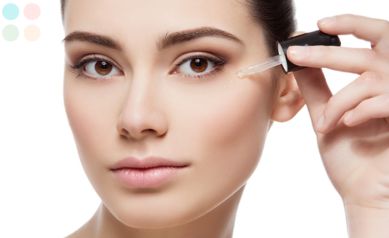Facial Serums Peculiarities Regarding other Medicines

It is time to supercharge your skin care! Just as you started to get to grips with the monotonous routine of cleansing, toning and moisturizing your skin every day the beauty world introduces a new, must-have, miracle step – serum. But what is it and do you really need to use one?
Serums overview
A serum is a skin care product that you apply to your skin after cleansing but before moisturizing with the intent to deliver a potent shot of ingredients directly into your skin.
Unlike a moisturizer, serums have a lipid-soluble basis, which allows the active ingredients to penetrate into the epidermis instead of lying on the surface. In this way, they can provide highly concentrated doses directly to your skin, which makes them great for targeting specific concerns like wrinkles, brightness, acne or hydration.
A serum can be applied in the morning, at night or both. So, how do you use one?
Using a pea-sized amount of serum, gently massage the product into your face and neck a couple of minutes are your cleanser. Then, proceed to apply your regular moisturizer and make-up as normal. There are also formulas specifically designed for nighttime use so that you can slather on the product for maximal results come morning.
Variety of products
That being said, with so many variations on the market, knowing which one to pick for your skin concern can be a minefield. Those with dry skin should look for serums that contain Vitamin E, glycolic acid and hyaluronic acid for extra moisture, elasticity and gentle exfoliation. While dull complexions will feel brighter and smoother thanks to ingredients like green tea extract and ferulic acid.
The biggest difference between a serum and a cream or lotion is what the formulation does not include. Serums leave out occlusive, or airtight, moisturizing ingredients such as petrolatum or mineral oil that keep water from evaporating. They also contain fewer lubricating and thickening agents, like nut or seed oils. Most serums are water-based, eliminating oils altogether.
Serums are a top pick of many skin care pros. The beauty of a serum is that most of the fluid is eliminated, so what you are left with is a high concentration of active ingredients. Serums contain the most potent dose of anti-aging ingredients – antioxidants, peptides, and skin brighteners such as kojic acid — you can find in nonprescription products. They are the true workhorses of any product line.
Serum Costs, Serum Benefits
Because active ingredients are more expensive than thickeners, serums are also the costliest product in many skin care lines. However, when applied properly, a 1-ounce container of serum should last months. Many brands come in pump bottles or have medicine-dropper applicators to dispense just the tiny amount you need.
Those few concentrated drops are super-efficient. Serums are made of very small molecules, so the skin absorbs them quickly and deeply. The thicker, heavier ingredients in creams form a barrier on your skin. That is great for locking moisture in. However, it can also lock active ingredients out. Without these hindrances, the active ingredients in a serum penetrate your skin faster and more effectively.
Still, serums are not for everyone. The liquid or gel-like texture of a serum can be a poor match for people with chronic skin conditions like eczema or rosacea, which weaken the skin barrier. For these people, serums may penetrate too quickly, causing irritation.
Others need the hydration that a rich day or night cream provides. If you have mature or dry skin, you cannot get away with using just a serum. Instead, serum suppose to be as an add-on to your skin care regimen, layered under your moisturizer. There is a lot of benefit to serums, from smoothing fine lines to reducing age spots, which you cannot reproduce in any other formulation.
